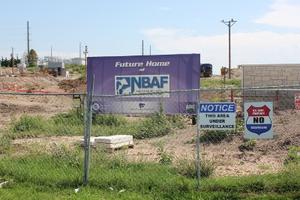BioLabsBudget, safety concerns cast doubt on Kansas BioLab
Uncertainty continues to surround the National Bio and Agro-Defense Facility, or NBAF, which is scheduled to be built on the campus of Kansas State University in Manhattan, Kansas, to replace the aging Plum Island facility; the price tag for the lab has increased from $415 million to an estimated $1.14 billion, and concerns about the safety of building a Level-4 BioLab in the middle of tornado alley are yet to be fully addressed

Site of the National Bio and Agro Defense Facility at KSU // Source: kcur.org
The White House has frozen $50 million that had been appropriated this year for the National Bio and Agro-Defense Facility, or NBAF, on the campus of Kansas State University in Manhattan, and eliminated funds for the project in next year’s budget..
The site has been chosen following a 3-year selection process, with five finalists making the final cut. The new, Level-4 lab will conduct research on plant and animal pathogens. It could start operations in 2018, replacing the aging Plum Island Animal Disease Center off the coast of Long Island, New York. If completed, the new facility would be larger than the combined areas of the Atlanta-based Centers for Disease Control and Prevention (CDC) and the Army’s main biodefense research lab in Fort Detrick, Marylandd.
The initially projected price tag of $415 million for the new lab has risen to an estimated $1.14 billion, which is not a good thing in times of shrinking government spending and revenues.. In addition, safety concerns and political friction continue to cast doubt on the centers’ future.
These obstacles notwithstanding, there is support for the project at the highest federal levels. Recently, Agriculture Secretary Tom Vilsack said his department would work with Congress and the Department of Homeland Security to fund the project. “I think it’s a national priority, and we’re going to continue to advocate for it with the Department of Homeland Security,” Vilsack said.
Given the possible boost to local economy, Kansas governor Sam Brownback has pooled his efforts in working with U.S. Representative Lynn Jenkins(R), whose district includes Manhattan, and Senator Pat Roberts, a Kansas Republican who has long been lobbying for the NBAF in Washington. A study commissioned by K-State estimated an economic impact on Kansas of about $2.5 billion, including more than 750 construction jobs and 320 permanent workers.
So far the biggest state investment has come from K-State’s Biosecurity Research Institute, which sits across from the NBAF construction site. The center, which opened in 2010, helped attract the NBAF to K-State grounds. It cost Kansas about $58 million to build and many more millions of dollars have been invested to support NBAF-related research there. Most state funds for the institute came through the Kansas Bioscience Authority, a public-private partnership that came under harsh scrutiny after expense reports revealed excessive spending related to lobbying for the NBAF. The Johnson County district attorney is reviewing a forensic audit to decide whether to file criminal charges.
The proposed lab also receives support from powerful lobbying groups, such as the Kansas Livestock Association, but there is a growing opposition movement whose concerns are mainly related to safety issues. A 2010 risk assessment by DHS has been strongly criticized by the National Research Council for not adequately considering risks to NBAF from tornadoes or seismic activity. The council is part of the National Academy of Sciences, a group of independent non-profit institutions that provide expert advice on complex scientific challenges. A committee of the Research Council is now reviewing an updated assessment of NBAF by DHS. The threats stem from having a bio-defense research lab, doing research into highly infectious diseases in the center of tornado alley, and at the heart of an area where a large segment of the U.S. beef industry is located. The committee is expected to issue its report by 30 June of this year.
